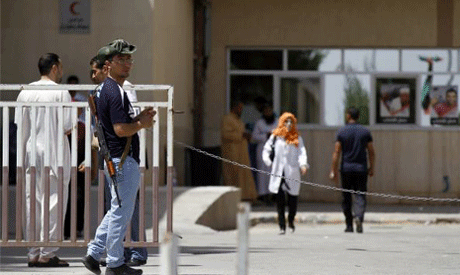
A hospital in Gheryan waits to receive the injured from fighting between rival militias in western Libya in Gheryan June 17, 2012. (Photo: Reuters)
Candidates competing in Libya's first national poll since the ouster of Muammar Gaddafi must address how they will tackle torture and illegal detention, Human Rights Watch said on Monday.
"Torture and illegal detention are an ongoing national crisis that Libya’s future leaders need to address," said HRW's special advisor Fred Abrahams.
"Libyans deserve to know how the candidates for this landmark election will solve these serious problems and reform the justice system after decades of abuse," Abrahams stressed.
At least 7,000 people who were detained during or after the 2011 conflict that toppled Gaddafi are still in detention, said the watchdog citing Libyan government officials and the United Nations.HRW estimates that "roughly 4,000 of them are being held by various militias across the country in both formal and secret detention facilities. The rest are in facilities run by the government."
Most detainees are Gaddafi security forces members, former regime officials, suspected Gaddafi loyalists, suspected foreign mercenaries or migrants from sub-Saharan Africa, it added.
Some have been detained for more than a year without being brought before a judge, most have been denied access to lawyers, and in many cases, there appears to be no legal basis for their detention, said HRW.
It quoted judicial police as saying 3,058 people were in custody, of whom only 194 had been sentenced as of June 13.
Justice Minister Ali Hmeida Ashur told HRW in April that he did not know the exact number of militia-held detainees, some of whom he said here in secret prisons.
"The time for secret prisons should have passed with Gaddafi’s fall. The Libyan government should know the name, age, and location of every person in detention, and should have brought charges," Abrahams said.
The statement comes as electoral campaigning formally begins with 2,501 individual candidates and 1,206 candidates from 142 politician entities competing in the first national election after four decades of dictatorship.
Libyans are expected to vote for a General National Congress on July 7.
Short link: